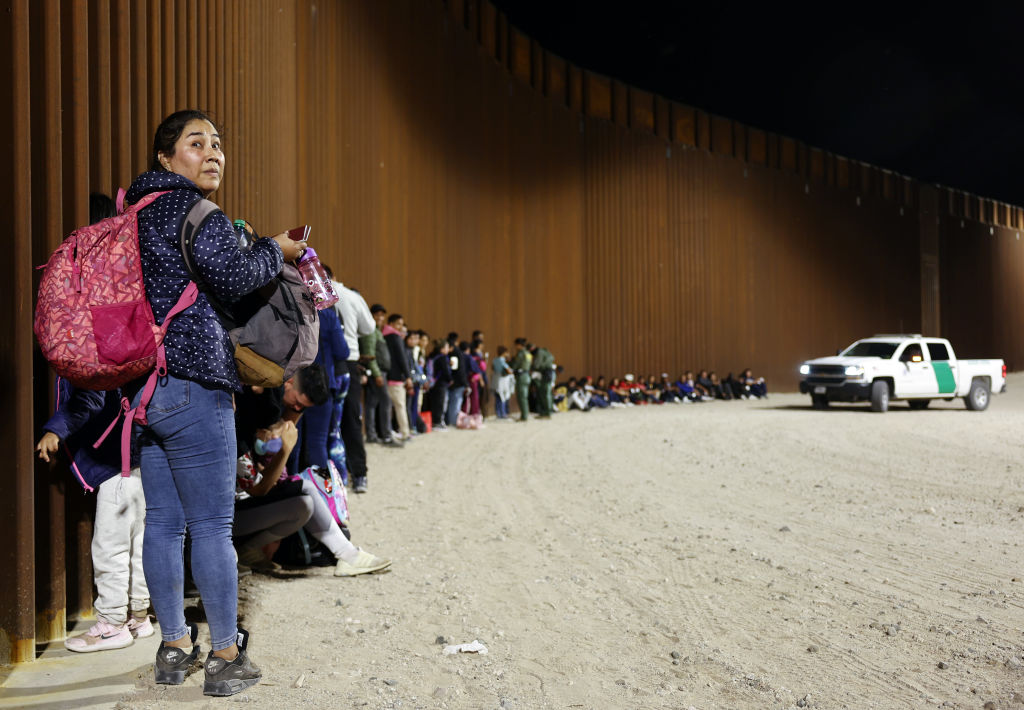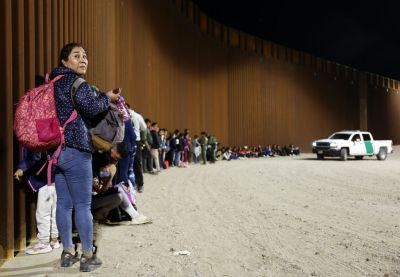Happy Wednesday! Everyone send out your thoughts and prayers to Cleveland Browns running back Nick Chubb, whose knee injury in a Monday matchup against the Pittsburgh Steelers was so brutal the ABC broadcast team judged it too gruesome to show on instant replay.
Quick Hits: Today’s Top Stories
- Ukrainian President Volodymyr Zelensky addressed a gathering of the United Nations General Assembly Tuesday, warning that Russian aggression could extend beyond Ukrainian borders if it is not beaten back. He also called the kidnappings and forced displacement of Ukrainian children to Russia “clearly a genocide.” Before departing Ukraine for the U.S.—where he’ll also meet with President Joe Biden at the White House and U.S. senators later this week—Zelensky fired all six of his deputy defense ministers as part of an ongoing crackdown on graft. Meanwhile, Ukrainian officials denied the findings of a New York Times investigation suggesting that a midday rocket that killed more than a dozen people after hitting a busy market in eastern Ukraine earlier this month was a tragic Ukrainian misfire, not a Russian attack.
- Canadian Prime Minister Justin Trudeau said earlier this week Canadian authorities were investigating “credible allegations” that India’s government was behind the June shooting death of a Canadian Sikh leader, Hardeep Singh Nijjar, in British Columbia. Canada’s minister of foreign affairs said the country expelled an Indian diplomat Monday, a move India reciprocated Tuesday in a diplomatic tit-for-tat.
- Azerbaijan’s military launched an attack against the unrecognized breakaway state of Nagorno-Karabakh on Tuesday, calling the bombardment against the ethnically Armenian region’s de facto capital an “anti-terrorist” operation. Azerbaijan’s defense ministry also said they’d be evacuating Armenians from “dangerous areas,” sparking fears of ethnic cleansing. A 2020 war between Armenia and Azerbaijan over the region left thousands dead, and the latest salvo—which Armenian state media reported had killed five people and injured 80–threatens to restart the conflict over control of the territory.
- A Moscow court on Tuesday declined to hear jailed Wall Street Journal reporter Evan Gershkovich’s third attempt to appeal his pretrial detention. Gershkovich—who was arrested on March 29 in Yekaterinburg, Russia, and charged with espionage—will remain in Moscow’s Lefortovo prison until at least November 30, and no trial date has yet been set.
- The Wall Street Journal reported Tuesday China’s former foreign minister Qin Gang—removed from his post last month over what the Chinese Communist Party described as “health issues,” after a mysterious weeks-long absence from public view—had engaged in an extramarital affair during his time as his country’s ambassador to the U.S., from July 2021 to January of this year. The affair reportedly resulted in a child born in the U.S., though the identities of the woman and child have not been publicly disclosed. Qin was once a close ally of Chinese President Xi Jinping.
- President Joe Biden on Monday announced $11 million in additional humanitarian aid to Libya after devastating flooding in the country’s northeast last week left more than 11,000 people dead—and more than 10,000 missing in one city alone. The funds, administered by the State Department and the U.S. Agency for International Development, will bolster United Nations humanitarian efforts through the UN World Food Program and High Commissioner for Refugees, as well as other partners.
- The U.S. national debt surpassed $33 trillion this week for the first time in history, in part due to a 50 percent increase in federal spending between fiscal year 2019 and 2021, the Treasury Department said. The milestone comes as House Republicans battle over government funding, with federal spending driving much of the debate.
- The first impeachment hearing in House Republicans’ inquiry into President Biden is slated for September 28, when the House Oversight Committee chaired by Rep. James Comer will focus on “corruption and abuse of public office.” The committee also plans to subpoena the bank records of the president’s son, Hunter Biden, and his brother, James Biden.
Border Crossings Are Surging… Again

As the number of migrants crossing the border has surged in the past two months, the leaders of large cities absorbing part of the new wave are continuing to sound the alarm. “Never in my life have I had a problem that I did not see an ending to,” Eric Adams—the mayor of New York—said earlier this month of the migrant crisis. “This issue will destroy New York City.” And a growing number of Democrats—especially Adams—are placing blame squarely on the Biden administration. Even progressives like Rep. Alexandria Ocasio-Cortez, who has objected to Adams’ rhetoric on the issue and articulates what might be called a “pro-migrant” view, have knocked the White House. “Immigration is arguably this administration’s weakest issue,” Ocasio-Cortez said last month.
The Biden administration’s border policies are back in the spotlight as record numbers of migrants cross the border and end up in major cities across the country, overwhelming urban social services. There’s no indication the flow will slow any time soon.
The story has changed quite a bit since the spring. Title 42—a pandemic-era policy that allowed border officials to quickly expel migrants without letting them apply for asylum—expired in May, and federal officials were bracing for a huge surge in migrants as a result. The wave, however, didn’t materialize as expected, with illegal border crossings dropping in May and June. The Biden administration touted the decrease as the product of their suite of border policies, which include stiffer penalties for illegal entry, tighter rules around asylum claims, new legal immigration pathways for citizens of select countries, and a new app to streamline migrant applications.
“Since the CDC’s Title 42 public health order lifted and the Biden-Harris Administration’s comprehensive plan to manage the border went into full effect on May 12, DHS has continued to experience a significant reduction in encounters at the Southwest Border,” a statement from the Department of Homeland Security boasted in June. The number of Border Patrol migrant encounters in June—approximately 99,000, according to the agency—represented a decline of 42 percent compared to the previous month.
But before long, the numbers began creeping up again. U.S. border agents made more than 130,000 arrests along the southern border in July and 182,000 in August, according to preliminary data. This past Sunday alone, Border Patrol officials apprehended 7,500 migrants—up from a daily average of about 4,300 in July. In August, 91,000 migrants crossed the border as families, setting the one-month record—the previous high was 84,486 in May 2019. The subsequent strain on the border patrol’s resources has reportedly resulted in some migrant children being temporarily separated from their parents. “We remain vigilant and expect to see fluctuations, knowing that smugglers continue to use misinformation to prey on vulnerable individuals,” Erin Waters, a spokesperson for CBP, said in comments last month.
The resurgence has raised further doubts about the effectiveness of the administration’s post-Title 42 policies, initially heralded as a success. Deploying a carrot-and-stick approach, the White House tried to simultaneously deter illegal crossings and incentivize migrants to follow legal pathways to apply for entry before making the treacherous journey to and across the southern border. As we wrote in May when the policies were first announced:
With the end of Title 42, immigration enforcement has returned to the Title 8 status quo—with some Biden administration updates expanding parole and limiting asylum claims. Consequences for illegal entry can now include a five-year entry ban and criminal prosecution. U.S. law gives anyone on U.S. soil the right to claim asylum, but under the new rules—which the American Civil Liberties Union has already sued to block—people who cross between the official entry points will face a higher barrier of proof for their asylum claims, as will those who can’t prove their plea for safety was rejected in a country they passed through on their way to the United States. At official entry points, asylum appointments must now be scheduled in the Customs and Border Patrol’s new app.
As part of the carrot approach, the administration opened up a new humanitarian parole program that allows migrants of certain nationalities to apply for two-year work permits so long as they have a passport and someone in the U.S. to sponsor them. Some 30,000 people from Cuba, Haiti, Nicaragua, and Venezuela are allowed to enter each month under these new rules (the policy is currently being challenged in federal court). DHS also said it would open migrant processing centers in Central and South America to further facilitate migrant applications before people travel to the border and to ease the strain on border officers. But it remains unclear how much progress the “Safe Mobility Offices” are making, with some reports of long wait times and delays leaving asylum seekers in the lurch.
The Biden administration has defended its approach by pointing to reductions in the illegal crossings of the migrant groups eligible for the program. Border patrol encounters with people from Cuba, Haiti, and Nicaragua declined after the parole program was instituted. But the surge has continued to be driven by the extraordinary number of displaced migrants looking to enter the U.S. More than 7 million Venezuelans have fled the country since 2015 with hundreds of thousands traveling to America.
The administration has also made relatively little use of some of the new deterrence and removal policies announced in May. Family Expedited Removal Management—a policy designed to disincentivize asylum seekers crossing the border illegally with their children—requires “certain heads of household for family units” to wear a GPS ankle monitor and comply with a nightly curfew. If the families pass “credible fear” interviews—a screening process for asylum eligibility—they are allowed to remain in the U.S. while they await a decision on their asylum case in court. If the families fail the interviews, they are supposed to be quickly deported. Only 2,600 migrants (1,500 of which are heads of household) have been placed in the monitoring program, and reportedly fewer than 100 parents and children have been deported under the system.
For the hundreds of thousands of people released into the U.S. without ankle monitors, DHS often can’t keep track of where migrants are located. Between March 2021 and August 2022, more than 1 million migrants were released to await their immigration hearings. A DHS Office of Inspector General report released earlier this month found that 177,000 of the migrant records reviewed had addresses that were “either missing, invalid for delivery, or not legitimate residential locations.”
Homeland Security Secretary Alejandro Mayorkas has simultaneously defended the administration’s policies while arguing comprehensive immigration reform is needed. “Fundamentally, we are dealing with a broken immigration system, and that includes the asylum process,” Mayorkas said at the end of July. When pressed on the recent resurgence in crossings, he argued DHS should be graded on a curve. “Wasn’t everyone very, very concerned about 10,000, 12,000, 14,000 crossings a day?” Mayorkas told reporters last week. “We haven’t experienced that.”
The surge has put significant pressure on large cities where migrants have been bused—in some cases by the Republican governors of states like Florida and Texas. New York City has seen more than 100,000 asylum seekers arrive in the city since April 2022, stretching its shelter system to the breaking point. “The idea of immigrants in homeless shelters is a relatively new phenomenon,” says Matthew Soerens, a vice president of advocacy and policy at the refugee agency World Relief. “One of the distinctions with what’s happening right now compared to what was happening a few years ago is that the people who are showing up—not in all cases, but in many cases—are coming from places like Venezuela that have less social capital in the United States. That is to say, they’re not all showing up and living with their cousins who already lived here, which would be more typical with a lot of Central American migration that we’ve seen.”
“What tended to happen with Guatemalan or Honduran or even Mexican migration is people would show up not authorized to work but their relatives would help them find a job anyway,” Soerens adds. “And they would be able to eventually cover their own rent and make ends meet.”
Migrant advocates and community leaders have pushed the Biden administration to allow for expedited work permits for migrants—federal law prevents asylum seekers from seeking a work permit until six months after they have applied for asylum (itself a lengthy process). “The biggest thing that people want is to work,” Soerens tells TMD. “It’s not even a time when they would be taking a job that some American is likely to be looking for because there’s so many businesses desperate for workers.” But changing the permit process would require Congress to reform immigration law—a highly unlikely outcome.
Some Democratic leaders in New York are scoping out dubiously legal state workarounds for faster permits, further highlighting the divide between state and national Democratic figures on the issue. “The migrant crisis is exposing Democratic policy weakness at every level,” Fareed Zakaria—a foreign affairs columnist for the Washington Post and CNN host—wrote last week. “Unless Democrats seize control of the issue, the politics of it will end up having the same effect as in other Western countries—rocket fuel for the populist right.”
Worth Your Time
- In a preview of his forthcoming book, Andrew Ferguson explores the annotations in Richard Nixon’s books and what they might reveal about the man himself. “I had been nosing around in a cache of volumes from Nixon’s personal library,” he writes in the Atlantic. “I was particularly interested in any marks he may have left in the books he’d owned. From what I could tell, no one had yet mined this remarkably varied collection, more than 2,000 books filling roughly 160 boxes stored in a vault beneath the presidential museum in Yorba Linda, California. Taken together, they reflect the broad range of Nixon’s intellectual curiosity—an underappreciated quality of his highly active mind. The task of a marginalia maven is at right angles to the task of reading a book: It is an attempt to read the reader rather than to read the writer. According to a report in Time magazine, when half a million citizens descended on Washington, D.C., in November 1969 to protest the Vietnam War, Nixon holed up in his private quarters with a book called The Decline of Radicalism: Reflections on America Today. The book, slim and elegant, had been sent to Nixon by its author, the historian Daniel Boorstin. Judging by his notations, Nixon was interested less in Boorstin’s turgid cultural analysis of ‘consumption communities’ and more in his thesis that the ragged protesters gathering outside the White House fence constituted something new in American history: They were not radicals at all but nihilists. Nixon brought out the pen, and in Yorba Linda, a continent and decades away from his White House hideaway, I could still feel the insistent furrow of his underlining on the page. People read books for lots of reasons: instruction, pleasure, uplift. This was Nixon reading for self-defense.”
Presented Without Comment
The Hill: [Senate Minority Leader Mitch] McConnell: Government Shutdowns Are ‘A Loser for Republicans’
Also Presented Without Comment
Semafor: Zelensky Tells UN Assembly: ‘Evil Cannot Be Trusted—Ask Prigozhin’
Toeing the Company Line
- What are the best inherently conservative television shows or movies? What are some practical ways to improve U.S. cities? Is David becoming more liberal? Kevin was joined by David French to discuss all that and more on last night’s Dispatch Live (🔒). Members who missed the conversation can catch a rerun—either video or audio-only—by clicking here.
- In the newsletters: Harvest offers an update in Uphill on the bitter battle over funding the government ahead of the September 30 deadline, and Nick argues (🔒) we should retire the “Mean to Mitt” theory of American politics.
- On the podcasts: Chris, filling in for Jonah on the Remnant, is joined by historian Amity Shlaes to discuss the origins of U.S. labor unions and the politics of the 1960s and ‘70s.
- On the site today: Mike tracks the complicated congressional alliances driving the current government shutdown battle—and how those members define them—and Jonah explains how McCarthy’s impeachment effort just might work.
Let Us Know
Would you support further expansions of the Biden administration’s parole program if it led to fewer illegal border crossings? What about expedited work permits?







Please note that we at The Dispatch hold ourselves, our work, and our commenters to a higher standard than other places on the internet. We welcome comments that foster genuine debate or discussion—including comments critical of us or our work—but responses that include ad hominem attacks on fellow Dispatch members or are intended to stoke fear and anger may be moderated.
With your membership, you only have the ability to comment on The Morning Dispatch articles. Consider upgrading to join the conversation everywhere.